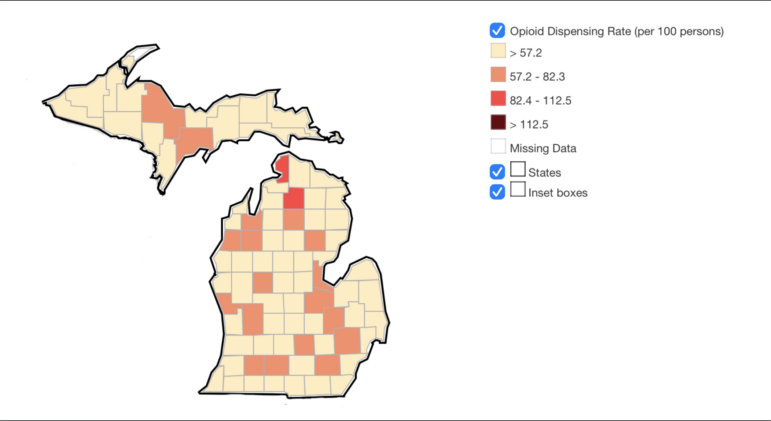
Centers for Disease Control and Prevention.
This map shows opioid dispensing rates in 2020. Otsego County and Emmet County were the two highest dispensing areas.By KELSEY LESTER
Capital News Service
LANSING – Over the next 18 years, Michigan will receive $1.5 billion in settlements from pharmaceutical companies responsible in part for the state’s opioid epidemic.
Now a bill by Sen. Rosemary Bayer, D–Keego Harbor, would prohibit local governments from suing drug manufacturers and pharmacy companies on their own.
“To ensure that Michigan receives the full amount of the settlement funds, the settlements must be added to the Opioid Liability Litigation Act,” Bayer told the Civil Rights, Judiciary and Public Safety Committee in mid-October. “This bill does just that.”
The number of opioid prescriptions filled in 2020 reached a whopping 142.8 million in the state, according to the most recent figures from the Michigan Department of Health and Human Services.
A national struggle since 2012, the opioid epidemic in Michigan can be traced in part to pharmacy chains like Walmart, CVS and Walgreens and manufacturers like Allergan and Teva that distributed the drug, according to Bayer.
As part of a 2021 national agreement with Johnson & Johnson and the “big three” drug distributors, the federal government reached a $26 billion settlement to preclude all state and local opioid litigation.
Michigan was allocated $776 million, which contributes to the $1.5 billion fund.
In addition, the Legislature enacted a law to prohibit the state government from further lawsuits against the defendants that settled opioid claims against them.
Then in 2022, additional settlements with pharmacies and manufacturers, including CVS and Walmart, were reached and will bring an estimated $445 million more to the state.
And in June, the state reached a $338 million settlement with Walgreens for its contribution to the state’s opioid epidemic.
Bayer’s bill would explicitly prohibit localities from suing the companies involved in the latest settlements.
However, Charlevoix County Commission Chair Scott Hankins said it’s better to keep local governments in control of such issues.
“Anything we can do to reduce those addictions, I think, is absolutely a positive for our society,” he said. “Local control is very important. And the state’s bureaucracies just muddy the waters too often.”
“Why would we ever craft legislation to keep people from being held accountable down the road — that makes no sense to me,” Hankins said.
Bayer told Capital News Service that the state’s share of the settlement proceeds is necessary to reduce homelessness, which is one of her main concerns.
“We have a lot of people that are impacted by the whole mess with opiates everywhere, and we need to help them get through,” she said. “It degenerates into mental illness, which generally takes you all the way into homelessness — it’s really tough to recover from that.”
Much of the state’s $1.5 billion piece of the settlements will go into the Michigan Opioid Healing and Recovery Fund. The Opioid Advisory Commission will recommend uses for the money.
“The opioid addiction is in every county — I think it’s in every county in the country,” Bayer said. “It starts with some medication. Next thing you know, you’re addicted.”
“Regular people I know have fallen into that and needed some pretty serious help to get out.”
Hankins said Charlevoix County is considering using its allocation of settlement money to create a drug court designed to help users recover from addiction, according to the U.S. Department of Health and Human Services.
Bayer’s bill, which passed the Senate unanimously, is awaiting House action.